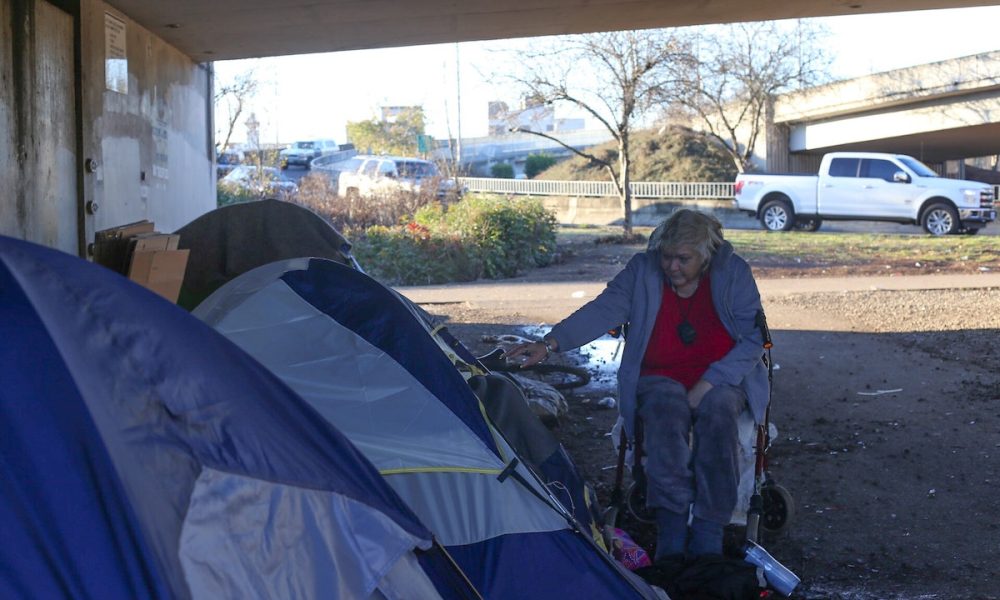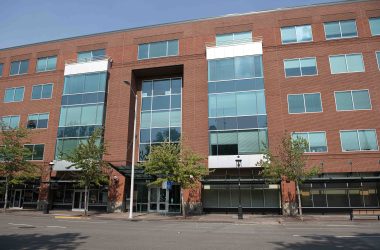 Sandra Carr, 73, sits next to a tent under the Marion Street Bridge on Wednesday. Carr said she has been homeless about two months after her trailer was stolen. (Troy Brynelson/Salem Reporter)
Sandra Carr, 73, sits next to a tent under the Marion Street Bridge on Wednesday. Carr said she has been homeless about two months after her trailer was stolen. (Troy Brynelson/Salem Reporter)
Community groups are calling for volunteers to run overnight warming shelters to keep people off Salem’s streets during the cold nights forecast the rest of the week.
Shelters open overnight when temperatures drop below freezing. Keeping multiple shelters open requires dozens of volunteers willing to work a few hours overnight.
“This has to be a community response. It can’t just be a Mid-Willamette response,” said Jimmy Jones, director of the Mid-Willamette Community Action Agency’s ARCHES project, which coordinates the shelters.
Shelter volunteers work one of three shifts from 7 p.m. to 7:30 a.m. Each shelter has three lead volunteers who resolve conflicts and manage other volunteers. About 25 volunteers are needed to staff the shelters.
Volunteers help check people in, store their possessions, monitor bathrooms and keep an eye out for problems.
People can volunteer by signing up here for First Presbyterian and here for Church at the Park.
 Tents under the Marion Street Bridge on Wednesday. Forecasts say temperatures will drop into the 20s by Thursday morning. (Troy Brynelson/Salem Reporter)
Tents under the Marion Street Bridge on Wednesday. Forecasts say temperatures will drop into the 20s by Thursday morning. (Troy Brynelson/Salem Reporter)
Two local shelters opened Tuesday night, sheltering 71 people. They are scheduled to be available Wednesday. Jones said a third shelter would have opened Wednesday night, but a lack of lead volunteers derailed that plan. The agency has a roster of 20 or 30 leads.
“Not all of them can do it every night and if we have a need for nine a night that’s where it gets problematic,” he said.
He hopes more people will sign up to volunteer this winter so they can train more lead workers.
Last year, ARCHES opened shelters when temperatures dipped below 27 degrees. This year, they set 32 as the benchmark because so many homeless people have serious health problems made worse in the cold, Jones said.
About 10 percent of the homeless people ARCHES serves report getting frostbite every winter, Jones said. More common are conditions like pneumonia.
“Subfreezing temperatures of any kind pose an enormous health risk,” he said.
People from all walks of life get cold-related injuries, but homeless people are more likely to have persistent infections or things unable to heal because they’re outside in wet, cold weather.
“Those type of injuries tend to get worse and worse,” said Josh Walterscheid, a doctor and medical director of the emergency room.
Temperatures are expected to remain cold through the work week, with lows Wednesday and Thursday in the upper 20s, as the skies remain clear. Clouds are expected to move in through the weekend, bringing rain and continually warmer temperatures, with a high of 39 on Sunday.
ARCHES keeps an eye on the forecast and puts out a call for volunteers either the night before or morning of they plan to open shelters. Those calls are posted on their Facebook page.
Since ARCHES took over the warming shelters six years ago, government has largely taken a backseat role. Salem Police Lt. Treven Upkes said the city only opens a warming shelter under extreme circumstances, so having the community step up has been a huge help.
As the nights cool and dip into freezing, Upkes said officers spread information among the homeless about the warming shelters. Some will refuse to use them, but Upkes said police can usually provide some food, blankets and warm clothes to those roughing it on the streets. Aside from that, there isn’t much law enforcement can do.
“We will try to accommodate people as best we can,” he said.
Jones said the warming centers are designed to address some of the reasons people may not seek out traditional shelters. People can bring pets inside, and ARCHES provides cages and crates for animals. Couples can come in together.
There are more than 1,200 homeless people in Marion County, including 619 living outside, according to ARCHES annual count in January.
“Most of the folks this helps are people coming in from the downtown core that don’t have camps, don’t have tents, don’t have sleeping bags,” he said.
Greg Hadley, assistant chief for the Salem Fire Department, said if his medics are called out, it usually means taking someone to the hospital. Hadley said while those calls have increased with the homeless population, they aren’t common and he isn’t aware of an increase as it’s gotten colder.
Two years ago, Union Gospel Mission ran the warming shelters in Salem. Now it focuses on its own housing, adding 48 beds November through March that augment the warming shelters. The cold snap is beginning to put space at a premium, said Executive Director Dan Clem.
“I think we were full last night so the timing is good to open up the warming shelters,” he said.
Union Gospel Mission handed over duties for the warming shelters to ARCHES Project and the Mid-Willamette Valley Community Action Agency. The mission has helped train volunteers in the past but not done so far this season, Clem said.
Clem added that concerns for the well-being of homeless people should go beyond keeping them warm.
“When the warming shelters are done, or when morning comes, people have to leave. The folks have tremendous needs in a lot of areas — food, mental health, clothing, having something to do during the day, getting to their appointments,” he said. “I want you to remember that the warming shelter is just a place to sleep. When we wake up in the morning, where do we go and what do we do?”
This story was updated to add information from Salem Hospital and ARCHES.









